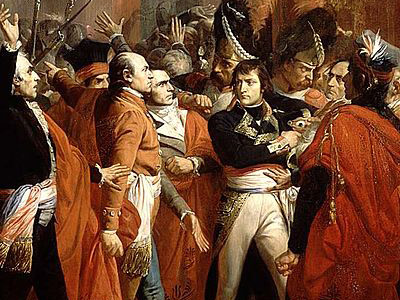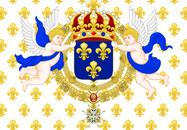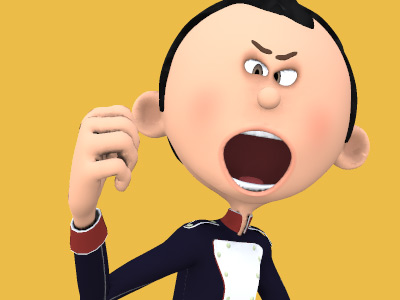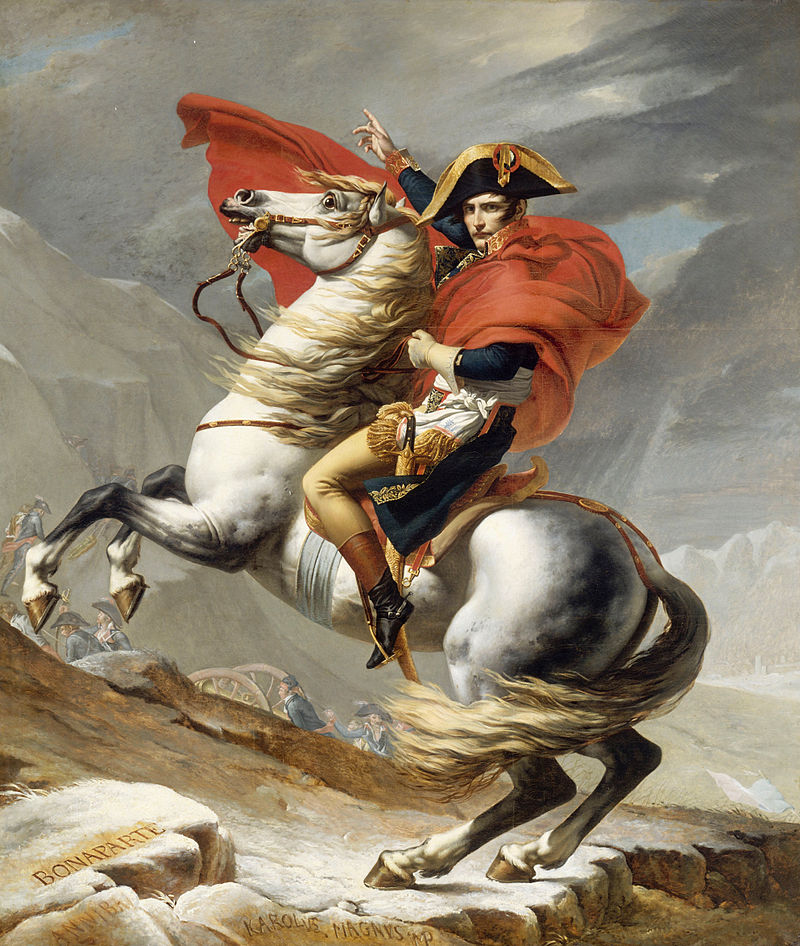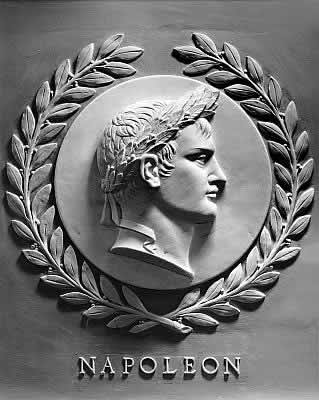Napoleon Bonaparte (1769-1821)
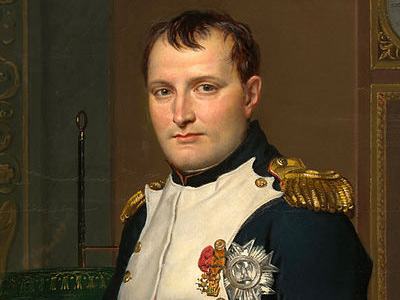
Exile to Elba
Napoleon withdrew back into France, his army reduced to 70,000 soldiers, and little cavalry; he faced more than three times as many Allied troops. The French were surrounded: British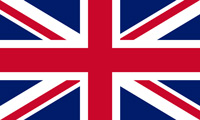 The British Empire, was composed of the dominions, colonies, protectorates, mandates, and other territories ruled or administered by the United Kingdom and its predecessor states. At its height it was the largest empire in history and, for over a century, was the foremost global power. By the start of the 20th century, Germany and the United States had begun to challenge Britain's economic lead. armies pressed from the south, and other Coalition forces positioned to attack from the German states. Napoleon won a series of victories in the Six Days' Campaign, though these were not significant enough to turn the tide for France
The British Empire, was composed of the dominions, colonies, protectorates, mandates, and other territories ruled or administered by the United Kingdom and its predecessor states. At its height it was the largest empire in history and, for over a century, was the foremost global power. By the start of the 20th century, Germany and the United States had begun to challenge Britain's economic lead. armies pressed from the south, and other Coalition forces positioned to attack from the German states. Napoleon won a series of victories in the Six Days' Campaign, though these were not significant enough to turn the tide for France First French Empire, officially the French Republic, then the French Empire after 1809, also known as Napoleonic France, was the empire ruled by Napoleon Bonaparte, who established French hegemony over much of continental Europe at the beginning of the 19th century. It lasted from 18 May 1804 to 11 April 1814 and again briefly from 20 March 1815 to 7 July 1815. A series of wars, known collectively as the Napoleonic Wars, extended French influence to much of Western Europe and into Poland.. The leaders of Paris surrendered to the Coalition in March 1814.
First French Empire, officially the French Republic, then the French Empire after 1809, also known as Napoleonic France, was the empire ruled by Napoleon Bonaparte, who established French hegemony over much of continental Europe at the beginning of the 19th century. It lasted from 18 May 1804 to 11 April 1814 and again briefly from 20 March 1815 to 7 July 1815. A series of wars, known collectively as the Napoleonic Wars, extended French influence to much of Western Europe and into Poland.. The leaders of Paris surrendered to the Coalition in March 1814.
On 1 April, Alexander addressed the Sénat conservateur. Long docile to Napoleon, under Talleyrand's prodding it had turned against him. Alexander told the Sénat that the Allies were fighting against Napoleon, not France, and they were prepared to offer honorable peace terms if Napoleon Napoleon Bonaparte (1769-1821), was a French military and political leader who rose to prominence during the French Revolution and led several successful campaigns during the French Revolutionary Wars. As Napoleon I, he was Emperor of the French from 1804 until 1814, and again in 1815. One of the greatest commanders in history, his wars and campaigns are studied at military schools worldwide. Napoleon Bonaparte » were removed from power. The next day, the Sénat passed the Acte de déchéance de l'Empereur ("Emperor's Demise Act"), which declared Napoleon deposed. Napoleon had advanced as far as Fontainebleau when he learned that Paris was lost. When Napoleon proposed the army march on the capital, his senior officers and marshals mutinied. On 4 April, led by Ney, they confronted Napoleon. Napoleon asserted the army would follow him, and Ney replied the army would follow its generals. While the ordinary soldiers and regimental officers wanted to fight on, without any senior officers or marshals any prospective invasion of Paris would have been impossible. Bowing to the inevitable, on 4 April Napoleon abdicated in favour of his son, with Marie Louise as regent. However, the Allies refused to accept this under prodding from Alexander, who feared that Napoleon might find an excuse to retake the throne. Napoleon was then forced to announce his unconditional abdication only two days later.
Napoleon Bonaparte (1769-1821), was a French military and political leader who rose to prominence during the French Revolution and led several successful campaigns during the French Revolutionary Wars. As Napoleon I, he was Emperor of the French from 1804 until 1814, and again in 1815. One of the greatest commanders in history, his wars and campaigns are studied at military schools worldwide. Napoleon Bonaparte » were removed from power. The next day, the Sénat passed the Acte de déchéance de l'Empereur ("Emperor's Demise Act"), which declared Napoleon deposed. Napoleon had advanced as far as Fontainebleau when he learned that Paris was lost. When Napoleon proposed the army march on the capital, his senior officers and marshals mutinied. On 4 April, led by Ney, they confronted Napoleon. Napoleon asserted the army would follow him, and Ney replied the army would follow its generals. While the ordinary soldiers and regimental officers wanted to fight on, without any senior officers or marshals any prospective invasion of Paris would have been impossible. Bowing to the inevitable, on 4 April Napoleon abdicated in favour of his son, with Marie Louise as regent. However, the Allies refused to accept this under prodding from Alexander, who feared that Napoleon might find an excuse to retake the throne. Napoleon was then forced to announce his unconditional abdication only two days later.
The Allied Powers having declared that Emperor Napoleon was the sole obstacle to the restoration of peace in Europe, Emperor Napoleon, faithful to his oath, declares that he renounces, for himself and his heirs, the thrones of France and Italy, and that there is no personal sacrifice, even that of his life, which he is not ready to do in the interests of France.
Done in the palace of Fontainebleau, 11 April 1814.
— Act of abdication of Napoleon
In the Treaty of Fontainebleau, the Allies exiled him to Elba, an island of 12,000 inhabitants in the Mediterranean, 20 km (12 mi) off the Tuscan coast. They gave him sovereignty over the island and allowed him to retain the title of Emperor. Napoleon attempted suicide with a pill he had carried after nearly being captured by the Russians Russian Empire was an empire and the final period of the Russian monarchy from 1721 to 1917, ruling across large parts of Eurasia. The rise of the Russian Empire coincided with the decline of neighbouring rival powers: the Swedish Empire, the Polish–Lithuanian Commonwealth, Qajar Iran, the Ottoman Empire, and Qing China. Russia remains the third-largest empire in history, surpassed only by the British Empire and the Mongol Empire. during the retreat from Moscow. Its potency had weakened with age, however, and he survived to be exiled while his wife and son took refuge in Austria. In the first few months on Elba he created a small navy and army, developed the iron mines, oversaw the construction of new roads, issued decrees on modern agricultural methods, and overhauled the island's legal and educational system.
Russian Empire was an empire and the final period of the Russian monarchy from 1721 to 1917, ruling across large parts of Eurasia. The rise of the Russian Empire coincided with the decline of neighbouring rival powers: the Swedish Empire, the Polish–Lithuanian Commonwealth, Qajar Iran, the Ottoman Empire, and Qing China. Russia remains the third-largest empire in history, surpassed only by the British Empire and the Mongol Empire. during the retreat from Moscow. Its potency had weakened with age, however, and he survived to be exiled while his wife and son took refuge in Austria. In the first few months on Elba he created a small navy and army, developed the iron mines, oversaw the construction of new roads, issued decrees on modern agricultural methods, and overhauled the island's legal and educational system.
A few months into his exile, Napoleon learned that his ex-wife Josephine had died in France. He was devastated by the news, locking himself in his room and refusing to leave for two days.
HISTORY
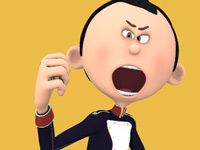
RESOURCES
This article uses material from the Wikipedia article "Napoleon", which is released under the Creative Commons Attribution-Share-Alike License 3.0.
© Stories Preschool. All Rights Reserved.
